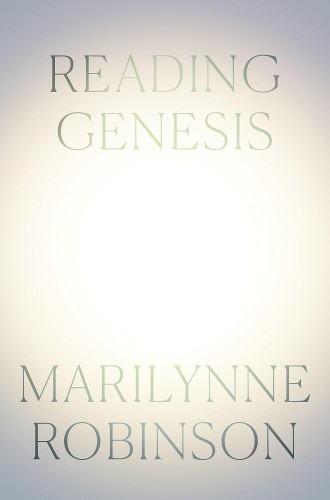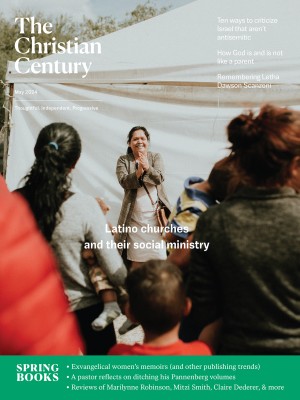Marilynne Robinson goes deep on Genesis
Her new book is a single essay of 230 pages that probes beautifully into the mind and heart of God.

Reading Genesis
Who doesn’t love Marilynne Robinson’s Gilead—or even more, her first novel, Housekeeping? Yet better than her fiction, for my tastes, are her brilliant essays, which reveal that she should be ranked among our wisest theologians. Now she offers us Reading Genesis.
It’s not a commentary. Not one chapter division is indicated. It is, rather, a single essay of 230 pages. Robinson warns that the habit of reading the Bible piecemeal for a sermon or scholarly argument overlooks the text’s larger structures and strategies. She detects that “in Genesis the recurring sin is grievous harm to one’s brother. Cain casts a long shadow.” Indeed, “Genesis is framed by two stories of remarkable forgiveness, of Cain by the Lord, and of his ten brothers by Joseph.”
Read our latest issue or browse back issues.
Through this understanding, Robinson is able to divine inner moods not verbalized in the text. How did Jacob live with those ten sons? He never asked if they had done away with Joseph, leaving unspoken “a question too terrible to be asked, a confession too terrible to be made, and Jacob growing old in this silence.” Amid this silence, did Jacob shiver as he recalled being a horribly flawed sibling to Esau? “Since the presumed death of Joseph,” Robinson writes, the grieving Jacob
would have noticed a grim bond among [the ten], stronger than loyalty, that excluded him. And he would not have been able to put aside the bitter knowledge that sons can deceive their fathers. Alone as he had been with his guilt as he stood absurdly disguised, lying to blind old Isaac, he might find a semblance of it in the tense caution of their dealings with him.
Robinson’s description of Jacob’s later reunion with Joseph also rings with truth: “the days of many years have been full of dread and loss and grief and suspicion, and no ending can be happy enough to change this.”
But discerning psychological insight isn’t Robinson’s default gambit. On page 1, she announces that “the Bible is a theodicy, a meditation on the problem of evil.” To accomplish this, the Bible must account for “things as they are,” including “the darkest aspects of the reality we experience,” and it “must reconcile them with the goodness of God.” Theodicy is no small feat, especially given the Bible’s refusal to sugarcoat or conceal stories that Robinson calls “far too ugly to be in the Bible.” She never explains away the ugly. For her, God’s will is “so strong and steadfast that it can allow space within providence for people to be who they are, for humanity to be what it is.” What humanity is isn’t pretty, and yet God’s image remains undiminished, as do God’s intentions, which simply refuse to fail.
Robinson’s discernment—that if human beings “are to be granted individuality, agency, freedom, meaningful existence as human beings, then God must practice almost limitless restraint” and that “to refrain, to put aside power, is godlike”—set my heart racing to Philippians 2, which she does not mention. When I read her insight that God “can change and not change,” that “immutability is not an inevitable consequence of His nature, as if options were denied Him by philosophical consistency,” I retrieved Jürgen Moltmann’s The Crucified God from my shelf and imagined him nodding in mighty approval.
Here, as in her essays, Robinson calls her probing of God’s mind and heart metaphysics. This term, while unusual in Bible talk, is spot on. The obfuscation of metaphysics is her primary objection to the historical-critical method and its much ballyhooed hermeneutics of suspicion. She suggests that we suffer from a “hermeneutics of self-protectiveness that has disabled interpretation,” issuing in “an abandonment of metaphysics as a legitimate mode of thought.”
You have to read that, and her entire book, slowly, which is also the best way to read the Bible. It is to be savored, pondered.
I found myself wishing to see Robinson engage the many positives of scholarship. And yet she rightly skewers the horde of commentators who pass along the guesswork produced by the documentary hypothesis as rock-solid fact. More importantly, she exposes how we are so enamored with sociopolitical influences in the formation of scripture that any notion of the text’s inspiration and trustworthiness is jettisoned.
She does thoroughly engage with ancient Near Eastern creation and flood narratives, which she has read in considerable depth. She is not troubled by similarities, which should be expected; she reflects on the startling ways Genesis engages that literature, hopefully offering humanity a nobler, more serene and gracious deity. Noting Romans 1 and Acts 17, Robinson dares to suggest that “in seeing paganism as a declined form of an original and potentially universal knowledge of God, Paul is granting it a degree of truth.”
Gilgamesh and Utnapishtim hardly debunk but oddly support Robinson’s answer to questions of historicity. What really happened? She provides a nuanced view (including a surprising take on Moses’ childhood and how he became a “primary influence” on Genesis!), burrowing into the modern fear of appearing credulous. Something happened. And then?
I imagine a circle of the pious learned . . . remembering together what their grandmothers had told them, finding the loveliness of old memory in an odd turn of phrase, realizing together that these strange tales sustained a sense of the presence of God that was richly renewed for them in their reverent deliberations.
Isn’t that how inspiration always unfolds?
Tucked among these larger thematic interests, we find little gems. Robinson concurs with my belief (and that of many) that Genesis 22 is an outspoken rejection of child sacrifice, which was common among Israel’s neighbors. But why did God even ask, and then intervene at the last moment? “Now Abraham knows that the most passionate worshippers of Moloch or Anat are not more devout than he.” Just close the book, sigh, and take a walk while you ponder that one.
There’s much more. After the flood, “the beauty of the trees is noted before the fact that they yield food,” as God intends for us to see and enjoy nature’s gifts, not just consume them. Noah does what God refuses to do: he curses a human being. Abraham’s Sarah-as-sister ploy? “The patriarchs act badly and the pagans act well.” She notices that Abraham has a throng of servants while Jacob has few, which might explain Esau’s indifference to the blessing. From all that Genesis reports about Rebekah and the troubles she caused, “there is really no evidence that she loved anyone.” Joseph, sending his brothers home, “makes a little joke, reminding them of the irksome boy he was once. ‘Do not quarrel on the way.’”
It would be gratuitous to say that Robinson writes well. It’s truer to say that she thinks profoundly and knows how to re-create profound thinking with sheer eloquence. By making covenants, “the Lord, in the thoughts of His heart, has yielded to His love for the incorrigible—in Old Testament terms, His Absalom; in New Testament terms, the Prodigal; in theological terms, the lot of us.” What a lovely clincher.
What a lovely book. Preachers, don’t expect to dip into it here or there to fashion or rescue a sermon. Read and ponder, and you’ll preach better—or be better. Go slowly, and don’t mind being mystified. After all, mystery is what Genesis is about.





